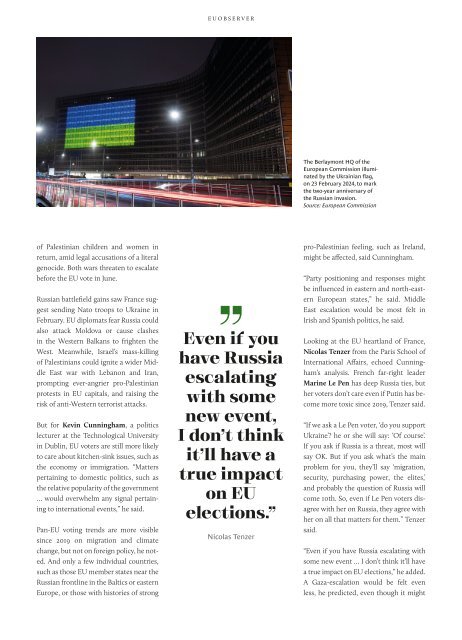EU Elections
EUobserver's guide to the 2024 European Parliament Elections.
EUobserver's guide to the 2024 European Parliament Elections.
- No tags were found...
You also want an ePaper? Increase the reach of your titles
YUMPU automatically turns print PDFs into web optimized ePapers that Google loves.
<strong>EU</strong>OBSERVER<br />
The Berlaymont HQ of the<br />
European Commission illuminated<br />
by the Ukrainian flag,<br />
on 23 February 2024, to mark<br />
the two-year anniversary of<br />
the Russian invasion.<br />
Source: European Commission<br />
of Palestinian children and women in<br />
return, amid legal accusations of a literal<br />
genocide. Both wars threaten to escalate<br />
before the <strong>EU</strong> vote in June.<br />
Russian battlefield gains saw France suggest<br />
sending Nato troops to Ukraine in<br />
February. <strong>EU</strong> diplomats fear Russia could<br />
also attack Moldova or cause clashes<br />
in the Western Balkans to frighten the<br />
West. Meanwhile, Israel’s mass-killing<br />
of Palestinians could ignite a wider Middle<br />
East war with Lebanon and Iran,<br />
prompting ever-angrier pro-Palestinian<br />
protests in <strong>EU</strong> capitals, and raising the<br />
risk of anti-Western terrorist attacks.<br />
But for Kevin Cunningham, a politics<br />
lecturer at the Technological University<br />
in Dublin, <strong>EU</strong> voters are still more likely<br />
to care about kitchen-sink issues, such as<br />
the economy or immigration. “Matters<br />
pertaining to domestic politics, such as<br />
the relative popularity of the government<br />
… would overwhelm any signal pertaining<br />
to international events,” he said.<br />
Pan-<strong>EU</strong> voting trends are more visible<br />
since 2019 on migration and climate<br />
change, but not on foreign policy, he noted.<br />
And only a few individual countries,<br />
such as those <strong>EU</strong> member states near the<br />
Russian frontline in the Baltics or eastern<br />
Europe, or those with histories of strong<br />
Even if you<br />
have Russia<br />
escalating<br />
with some<br />
new event,<br />
I don’t think<br />
it’ll have a<br />
true impact<br />
on <strong>EU</strong><br />
elections.”<br />
Nicolas Tenzer<br />
pro-Palestinian feeling, such as Ireland,<br />
might be affected, said Cunningham.<br />
“Party positioning and responses might<br />
be influenced in eastern and north-eastern<br />
European states,” he said. Middle<br />
East escalation would be most felt in<br />
Irish and Spanish politics, he said.<br />
Looking at the <strong>EU</strong> heartland of France,<br />
Nicolas Tenzer from the Paris School of<br />
International Affairs, echoed Cunningham’s<br />
analysis. French far-right leader<br />
Marine Le Pen has deep Russia ties, but<br />
her voters don’t care even if Putin has become<br />
more toxic since 2019, Tenzer said.<br />
“If we ask a Le Pen voter, ‘do you support<br />
Ukraine’? he or she will say: ‘Of course’.<br />
If you ask if Russia is a threat, most will<br />
say OK. But if you ask what’s the main<br />
problem for you, they’ll say ‘migration,<br />
security, purchasing power, the elites,’<br />
and probably the question of Russia will<br />
come 10th. So, even if Le Pen voters disagree<br />
with her on Russia, they agree with<br />
her on all that matters for them.” Tenzer<br />
said.<br />
“Even if you have Russia escalating with<br />
some new event … I don’t think it’ll have<br />
a true impact on <strong>EU</strong> elections,” he added.<br />
A Gaza-escalation would be felt even<br />
less, he predicted, even though it might

















